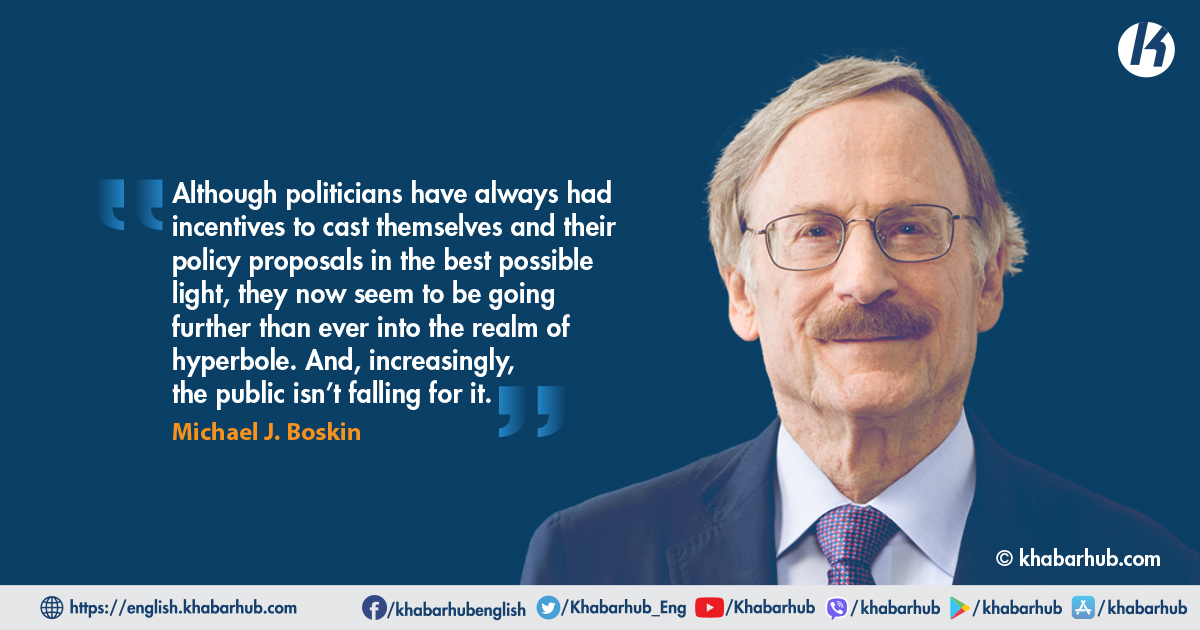Gone are the days when political leaders saw credibility as their most precious asset. From presidents and prime ministers on down, economic policymakers have crossed into territory beyond the familiar terrain of political hyperbole, becoming increasingly disconnected from voters’ own understanding of reality.
There are multiple explanations for this. First, today’s communication environment favors extreme statements over cold, dispassionate, fact-based analysis.
In a polarized society, politicians have grown more interested in feeding their extremist base than in offering moderation or compromise.
Second, forecasts sometimes turn out badly. The claim that “inflation is transitory” was not unreasonable at first; but it became more dubious with every passing month, partly because the public has a different understanding of the term than economists do.
To the average voter, transitory means “gone quickly,” a description that does not fit a problem that has not only persisted but worsened.
The American baseball legend Yogi Berra famously observed that prediction is tough, especially when it is about the future. In fact, because economic data sometimes must be substantially revised, even a description of current conditions can go astray.
There are also different interpretations of short- and long-run time horizons. Economists measure the short run in quarters or a year or two; but for the general public, short-run means weeks – or a couple of months at most.
Third, political leaders hate to be the bearers of bad news, preferring to blame problems on their opponents or some political foil like the oil and gas industry.
Every time gasoline prices spike, the left claims it is the result of a nefarious conspiracy of domestic producers. Yet to my knowledge, no such conspiracy has ever been found.
Though the OPEC cartel may seek to profit from market shifts, the price at the pump is ultimately subject to the forces of supply and demand.
The failure to see this reflects widespread economic illiteracy, which is the fourth reason for the current situation.
Most voters have limited capacity or time to absorb seemingly subtle points such as the differences between “high” and “rising,” “net” and “gross,” and “short run” and “long run,” let alone to understand probability. And, unlike economists, politicians usually don’t bother much with nuance.
Consider inflation. To economists, statistical agencies, central banks, and finance ministries, inflation means prices are rising.
But to the general public, inflation implies that prices are uncomfortably high for one’s budget. Suppose the 6.8% year-on-year increase in the US consumer price index were to fall to zero over the next 12 months.
Many people would still feel that inflation was not under control, because the previous increase in prices would not have been reversed.
Or, consider how economists and statistical agencies define a recession. Technical issues aside, it means that the economy is contracting – hence the oversimplified rule of thumb that a recession occurs when real (inflation-adjusted) GDP growth is negative for two consecutive quarters.
A recession, therefore, ends when the economy starts to grow again. But to the layperson, a recession hasn’t really ended until good times and plentiful jobs have returned. That is why slow economic recoveries are painful for those in power.
The difference between net and gross is another frequent source of confusion. A good example is the (usually exaggerated) claim that millions of jobs would be created by rapidly phasing out fossil fuels by relying on subsidies and mandates for wind and solar power.
Never mind all the fossil fuel-related jobs that would be lost. This argument emphasizes the gross while ignoring the net effect.
Another example is the budget-scoring gimmickry used to hide the true costs of legislation like US President Joe Biden’s “Build Back Better” (BBB) bill. To cram as many “progressive” policies as possible into a ten-year $1.75 trillion budget window, many benefits supposedly would end after a short period.
The implication is that programs lasting one, three, or six years would be paid for with ten years’ worth of tax hikes.
In fact, nobody believes that these programs will be allowed to lapse when their expiration dates arrive. As President Ronald Reagan famously said, “Nothing lasts longer than a temporary government program.”
Hence, when the Congressional Budget Office scored the budgetary cost as if the BBB programs would last the full ten years, the total soared to almost $5 trillion, $3 trillion of which would be added to the already unprecedented national debt.
Whatever temporary advantage this tactic confers, the resulting erosion of credibility eventually comes back to haunt political leaders of all stripes.
Democrats are hardly alone in using budget gimmickry. When Reagan’s budget director, David Stockman, was unable to get enough spending cuts to satisfy a law requiring that the budget forecast show a balanced budget a few years out, he included a famous asterisk: “spending cuts to be decided later.”
There are also different interpretations of short- and long-run time horizons. Economists measure the short run in quarters or a year or two; but for the general public, short-run means weeks – or a couple of months at most.
Feeling increasing pressure from rising inflation, Biden often repeats the claim by some prominent economists that his BBB bill will reduce inflation.
The logic here is that greater subsidies for childcare, paid family leave, and the like will enable more parents to work. That is a debatable empirical proposition.
But even if true, the argument relies on a claim about inflation in the coming years, not in the coming weeks or months.
It would be absurd to claim that massive additional government spending will quickly reduce short-run inflation in an economy that is already close to full employment. Not surprisingly, recent polls show that the public isn’t falling for it.
All political leaders feel pressure to try to circumvent the laws of economics or even the laws of arithmetic – as Biden has done by claiming that his bill costs nothing.
Whatever temporary advantage this tactic confers, the resulting erosion of credibility eventually comes back to haunt political leaders of all stripes.
That is especially true when politicians need public support the most. As my friend George P. Shultz used to say, “Trust is the coin of the realm.”
(Michael J. Boskin is Professor of Economics at Stanford University and Senior Fellow at the Hoover Institution)
Copyright: Project Syndicate









Comment